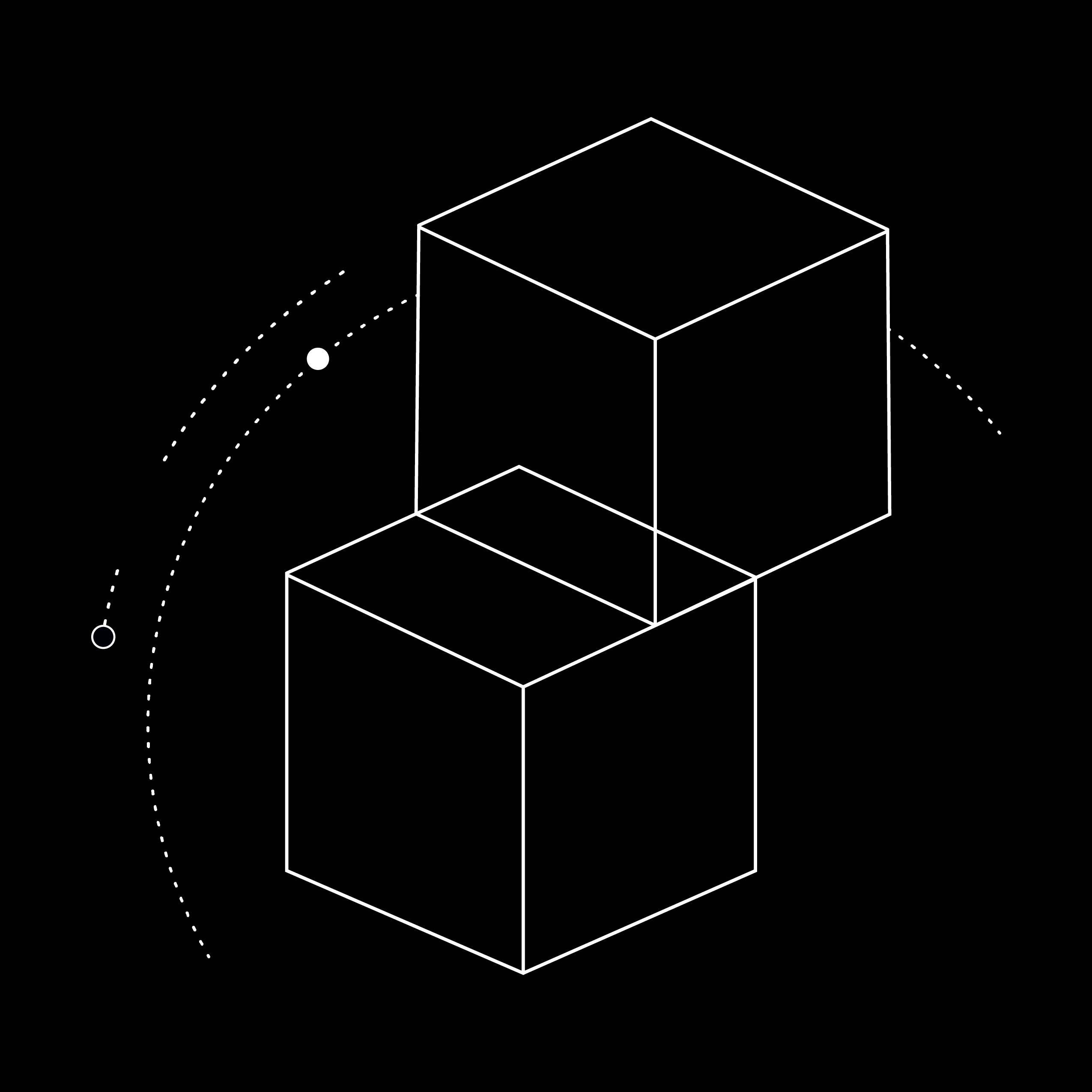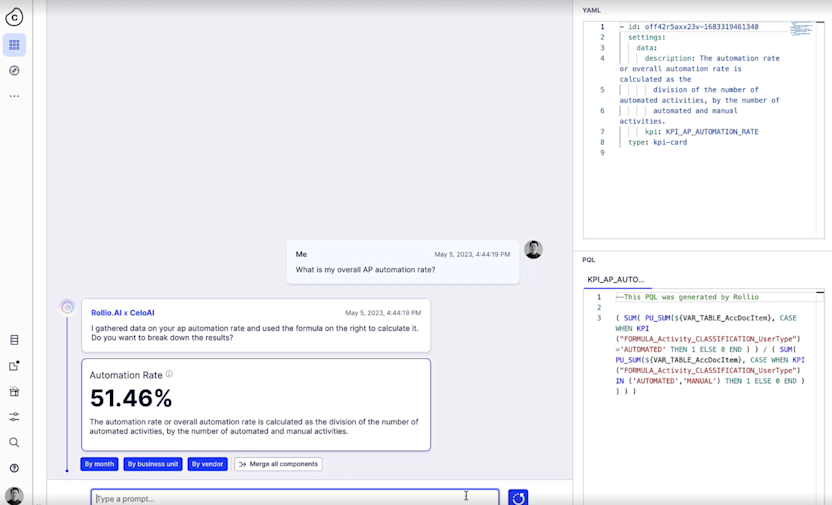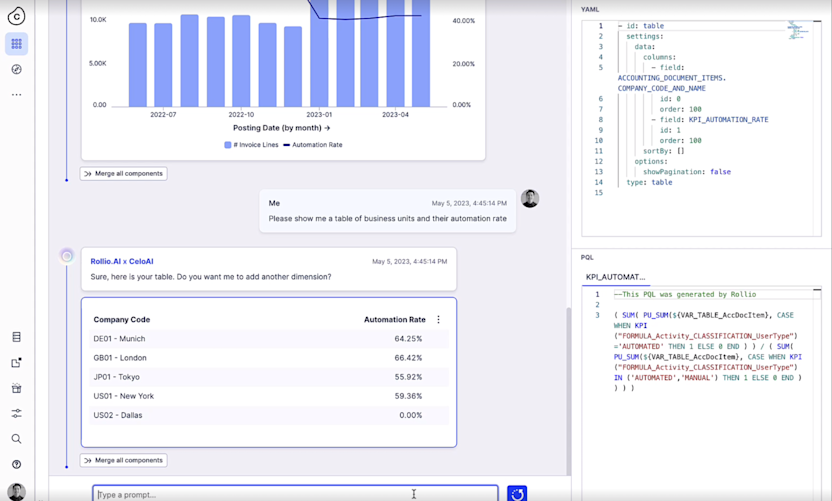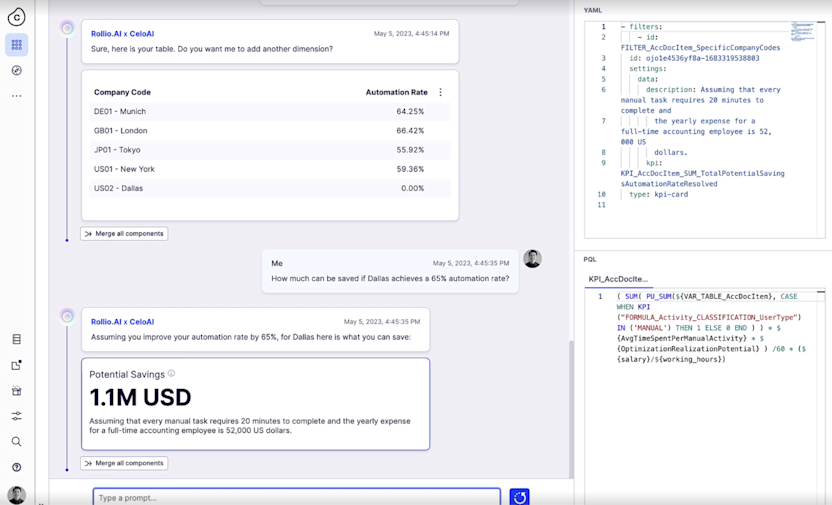
Celonis brings process intelligence to every business user with LLM for PQL Generation
For process mining to become the trusted digital assistant for every business and an essential tool for every user, it must empower both technical and non-technical individuals to find and capture value, fast. Today, Celonis demonstrated a new way of combining process intelligence and generative AI to enable everyone in the business to analyze and optimize processes.
At the first Celonis World Tour 2023 stop in Munich, the process mining company demonstrated how Large Language Models (LLMs) can turn natural language requests into process insights. During the event keynote, Martin Klenk, co-founder and CTO at Celonis, showcased LLM for PQL Generation, an artificial intelligence tool created in partnership with Rollio, a developer of online virtual AI assistants. LLM for PQL Generation translates user queries into Process Query Language (PQL), the language that Celonis EMS uses to turn process data into process intelligence.
“Celonis is in the unique position to leverage the multiplicative effect of generative AI and process knowledge to enable process intelligence,” said Jeff Naughton, Senior Vice President and Fellow at Celonis in a press release. “Combined with the rich process knowledge that Celonis has accumulated over a decade, helping customers drive process efficiency, generative AI has the potential to revolutionize how process mining and execution management can be democratized and leveraged by everyone within the enterprise.”
Democratizing process intelligence with a natural language interface
In a recent interview, Cong Yu, Vice President of Engineering, AI and Knowledge at Celonis, discussed how large language models (LLMs) could be used to create a natural language dialogue interface for exploring process data.
"If you think about how LLMs are trained, they're learning statistical patterns, and doing a very good job at that, from the vast amount of content on the Web. This includes common programming languages like Python and SQL,” Yu said. The same can be done for proprietary languages designed for specific business needs, such as Celonis Process Query Language (PQL).
“While this is not as visible as a chat interface, we believe the impact of LLMs, with infused process knowledge, on PQL generation could be a game-changer: it will make the job of our value engineers, as well as our partners and other users outside of the company, much easier, and significantly shorten the value journeys for our customers," Yu added.
PQL is a domain-specific programming language designed to translate business questions into executable process queries and then display the query results. It is an integral part of the Celonis software architecture, and all Celonis applications use it to query data from a data model.
PQL enables people to discover process insights, but it also requires time to learn the language and become proficient at using it within the Celonis platform. LLM for PQL Generation simplifies, accelerates and democratizes the process of creating Celonis analyses and visualizations, by allowing users to simply type their questions into the platform–no code required.
SEE: Celonis viewpoint: ChatGPT, LLMs will need process, ontology knowledge to be enterprise ready
What is LLM for PQL Generation?
LLM for PQL Generation is a Celonis EMS feature (currently in beta) that uses natural language processing (NLP) to translate natural language statements, queries and instructions into PQL. The user inputs a query or request that describes the desired analysis, and LLM for PQL Generation uses its deep learning algorithms to analyze the input and identify key information, such as the desired fields, tables and conditions. It then generates PQL code that corresponds to the query or command using standard PQL syntax and conventions.
For example, an analyst on a company’s Finance team could enter a question such as, “What is my overall AP automation rate?”

After Celonis presents the analyst with the answer, they can drill down on the results by entering a request, such as, “Please show me a table of business units and their automation rate.”

Assume that a newly-acquired division in Dallas shows a 0% automation rate. Our analyst could see the business impact of improving that rate by asking the question, “How much can be saved if Dallas achieves a 65% automation rate?”

In just a few minutes, the analyst has been able to create a custom Celonis analysis from scratch through a simple conversational interface and without writing a single line of PQL code.
LLM for PQL Generation reduces the need for manual coding and has the ability to learn from past queries and adapt to new requirements. This allows it to streamline workflows, improve data accuracy and enable faster, more efficient data retrieval.
A foundation for building process-intelligent business applications
Celonis is no stranger to using AI and machine learning (ML) to deliver more intelligent business decisions. The company's Machine Learning Workbench (MLWB) enables users to create custom models and the Duplicate Checking app uses ML algorithms to detect duplicate invoices. In a press release, Celonis said the LLM for PQL Generation announcement was an update on its broader AI strategy and, along with other World Tour 2023 announcements, illustrated the company’s commitment to “delivering an even more intuitive, open and intelligent platform.”
Celonis also emphasized the company’s continued dedication to helping its customers and partners build intelligent solutions with innovations such as object-centric process mining and Celonis’ Intelligence API.
“Our customers and partners are a big part of our intelligence efforts through partnerships and co-innovations,” said Martin Klenk, co-founder and CTO at Celonis. “We will make it easy for them by providing the best-in-class API access to rich process and business knowledge, LLM modeling capabilities, and ML infrastructure.”



